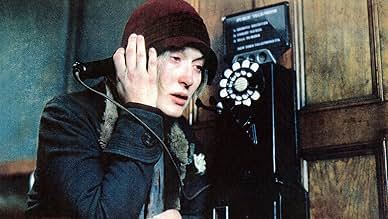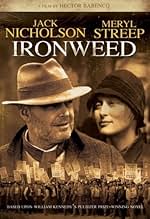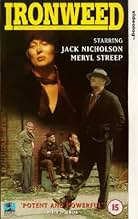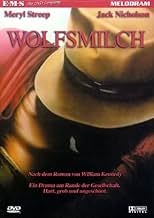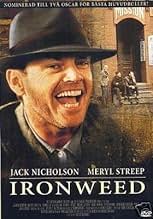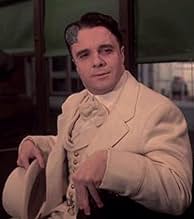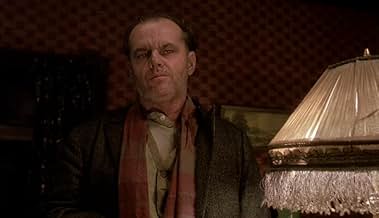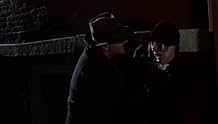IMDb-BEWERTUNG
6,7/10
10.451
IHRE BEWERTUNG
Ein alkoholkranker Drifter verbringt Halloween in seiner Heimatstadt Albany, New York, nachdem er zum ersten Mal seit Jahrzehnten dorthin zurückgekehrt ist.Ein alkoholkranker Drifter verbringt Halloween in seiner Heimatstadt Albany, New York, nachdem er zum ersten Mal seit Jahrzehnten dorthin zurückgekehrt ist.Ein alkoholkranker Drifter verbringt Halloween in seiner Heimatstadt Albany, New York, nachdem er zum ersten Mal seit Jahrzehnten dorthin zurückgekehrt ist.
- Für 2 Oscars nominiert
- 2 Gewinne & 4 Nominierungen insgesamt
Empfohlene Bewertungen
I found this movie on DVD at my public library, I watched it at home.
The Great Depression in the USA lasted from 1929 to 1939. This movie is set in 1938 Albany, New York, near the end of the Depression but with most communities in a depressed economic state.
Jack Nicholson is Francis Phelan, a drifter who has been away from home for some years. He returns right at Halloween, he meekly looks up his wife and two young adult children, but he calmly states that he doesn't plan to stay.
His friend with benefits for some years is Meryl Streep as Helen, former singer and entertainer who now was a shell of her former self.
In a non-glamorous role Carroll Baker is Francis' faithful wife Annie Phelan, she is surprised when he shows up but treats him with compassion.
This is just a slice of life story, bums and drifters doing what they can to sometimes find a little work, maybe get a sandwich here or visit the soup kitchen there, find an abandoned car to sleep in for the night without freezing.
I didn't find the story itself very enjoyable, it is a tragic story, but I found it worthwhile for Nicholson and Streep.
The Great Depression in the USA lasted from 1929 to 1939. This movie is set in 1938 Albany, New York, near the end of the Depression but with most communities in a depressed economic state.
Jack Nicholson is Francis Phelan, a drifter who has been away from home for some years. He returns right at Halloween, he meekly looks up his wife and two young adult children, but he calmly states that he doesn't plan to stay.
His friend with benefits for some years is Meryl Streep as Helen, former singer and entertainer who now was a shell of her former self.
In a non-glamorous role Carroll Baker is Francis' faithful wife Annie Phelan, she is surprised when he shows up but treats him with compassion.
This is just a slice of life story, bums and drifters doing what they can to sometimes find a little work, maybe get a sandwich here or visit the soup kitchen there, find an abandoned car to sleep in for the night without freezing.
I didn't find the story itself very enjoyable, it is a tragic story, but I found it worthwhile for Nicholson and Streep.
Given that we often hear a rather idealized version of the Great Depression - it seems like some people go so far as to treat it as the "good old days" - it's important to understand just what things were like back then. Hector Babenco's ultra-downer "Ironweed" does that. Jack Nicholson plays drifter Francis Phelan, who returns to his home town (where he hasn't been in years) and traipses around it, seeing the poverty prevalent throughout the Depression. He deals with his own demons and sees whether or not he can start up a new life. But he can't escape the reality of the status quo, or of his own past.
Watching this movie, you may feel like you've just been drug through a gutter. But one must wonder how much better things are nowadays. For how terrible the Depression was, it helped our country understand not only abject poverty, but what caused the Depression. In this era of air-heads slacking off and using as many resources as possible, I wonder whether or not we might be headed towards a new kind of Depression. If so, then the movie warned us.
Anyway, I recommend this movie, but understand that it's a total downer. Also starring Meryl Streep, Carroll Baker, Michael O'Keefe, Diane Venora, Fred Gwynne, Tom Waits and Nathan Lane.
Watching this movie, you may feel like you've just been drug through a gutter. But one must wonder how much better things are nowadays. For how terrible the Depression was, it helped our country understand not only abject poverty, but what caused the Depression. In this era of air-heads slacking off and using as many resources as possible, I wonder whether or not we might be headed towards a new kind of Depression. If so, then the movie warned us.
Anyway, I recommend this movie, but understand that it's a total downer. Also starring Meryl Streep, Carroll Baker, Michael O'Keefe, Diane Venora, Fred Gwynne, Tom Waits and Nathan Lane.
"Ironweed" is a good movie and a scathing indictment of life in modern America. Jack Nicholson and Meryl Streep effectively portray a pair of homeless bums on the cold late October streets of Albany, New York during the Great Depression. Their day to day existence revolves around simple survival in the most difficult of circumstances -- how to keep from going hungry, where to score a few hours work or a few drinks, and where to "flop" come nightfall in order to avoid being beaten and robbed or freezing to death. You don't have to be a bum to understand this list of priorities, although certainly, spending any time without a conventional home will clue you in like nothing else can. There are, you see, several levels of homelessness, street people of various kinds occupying the lowest tier. A level above that are the people who live in their cars, camping at the curb or crashing with friends, some of them duly employed while others are "between jobs." Then there are those who spend months or even years living in recreational vehicles of one sort or another and migrating with the seasons. These are the elite of the homeless crowd, ranging from truly adventurous souls who occasionally go without enough food to those with substantial bank accounts and second homes. Nonetheless, most if not all of them understand something about being kicked around and shown the door, just like the bums in this flick. Certainly, they all understand what its like on occasion not to know where you will end up spending the night, why authority figures are to be avoided, and why conventional people are nearly always the enemy, whether they know it or not.
"Ironweed" puts a human face on the kinds of people society scorns the most -- street people, who live in filth and seldom wash, who often abuse alcohol or drugs yet haven't enough to eat and may dig through garbage searching for an abandoned morsel. They often live this way for a reason and not only because they have no choice. Frank has a choice but he is convinced that to go home "won't work out." He's a luckier bum than his fellows, who seem to have no choice at all. Oddly, it's pride just as much as eccentricity, incipient insanity, or alcoholism that keeps them where they are. Helen was a successful singer before her life went on the skids. Too much wine, a slump in her career, and being robbed of her inheritance seemed to signal her inevitable slide into oblivion. Now she barks at passersby and sleeps with whomever will tolerate her presence -- at a price, of course. Sandra is a drunk, an ex-whore, and in terrible shape when the others discover her passed out against a lamppost in freezing weather. They get her a blanket and some hot soup and prop her against a wall, but obviously, she is not long for this world. Rudy's a good sport, a bum's true friend, and he just scored a new gray suit, but he's been given six months to live and soon enough his new threads are grimy and tattered, just like the old ones. And so goes it. Only the strongest survive. All the while the comfortable bourgeoisie look upon the suffering of these brave souls with contempt, disgust, and often, unbridled hostility, hoping to avoid them and occasionally making them pay dearly for the inconvenience. Although the bums seem to scurry at the margins of society like rats on the prowl for scraps, they are, in a way, truly living. For however unenviable their precarious lot may be, they are on the edge, so unlike the predictable, dull, and hypocritical existence of the conventional folk around them. At times, one either knows or suspects that the bums are being romanticized or their foibles somewhat exaggerated, but nonetheless, the story comes off as reasonably authentic. And the acting in it is superb. One criticism, however -- the soft focus effect throughout. I take it the director was attempting to blur further the distinction between fantasy and reality, posing as it did a continuing problem for the main characters, who often dreamed of some simple connection to dignity, comfort, and security while in the throes of their unrelenting misery. Nonetheless, I would have preferred a sharp focus. Otherwise, I found this flick to be very inspired.
"Ironweed" puts a human face on the kinds of people society scorns the most -- street people, who live in filth and seldom wash, who often abuse alcohol or drugs yet haven't enough to eat and may dig through garbage searching for an abandoned morsel. They often live this way for a reason and not only because they have no choice. Frank has a choice but he is convinced that to go home "won't work out." He's a luckier bum than his fellows, who seem to have no choice at all. Oddly, it's pride just as much as eccentricity, incipient insanity, or alcoholism that keeps them where they are. Helen was a successful singer before her life went on the skids. Too much wine, a slump in her career, and being robbed of her inheritance seemed to signal her inevitable slide into oblivion. Now she barks at passersby and sleeps with whomever will tolerate her presence -- at a price, of course. Sandra is a drunk, an ex-whore, and in terrible shape when the others discover her passed out against a lamppost in freezing weather. They get her a blanket and some hot soup and prop her against a wall, but obviously, she is not long for this world. Rudy's a good sport, a bum's true friend, and he just scored a new gray suit, but he's been given six months to live and soon enough his new threads are grimy and tattered, just like the old ones. And so goes it. Only the strongest survive. All the while the comfortable bourgeoisie look upon the suffering of these brave souls with contempt, disgust, and often, unbridled hostility, hoping to avoid them and occasionally making them pay dearly for the inconvenience. Although the bums seem to scurry at the margins of society like rats on the prowl for scraps, they are, in a way, truly living. For however unenviable their precarious lot may be, they are on the edge, so unlike the predictable, dull, and hypocritical existence of the conventional folk around them. At times, one either knows or suspects that the bums are being romanticized or their foibles somewhat exaggerated, but nonetheless, the story comes off as reasonably authentic. And the acting in it is superb. One criticism, however -- the soft focus effect throughout. I take it the director was attempting to blur further the distinction between fantasy and reality, posing as it did a continuing problem for the main characters, who often dreamed of some simple connection to dignity, comfort, and security while in the throes of their unrelenting misery. Nonetheless, I would have preferred a sharp focus. Otherwise, I found this flick to be very inspired.
There are many reasons why this film is a masterpiece, but the most significant element is surely Streep's portrayal of a homeless alcoholic in 1930's Albany. Her appearance, about half an hour into the film, is quite frankly, astonishing. She walks into a soup kitchen and sits down next to Nicholson and your jaw drops at the transformation. Beyond the technical virtuosity, you marvel at the choices that Streep makes that express the character so movingly, from the vocal production which is almost like a groan of pain, to the body language including her constantly averted glance and shuffling walk which express the woman's lost self esteem, to her bursts of rage when we see the glimmer of the spirit she once posessed. There's a scene in a bar in which she sings for the patrons that you will never forget.
Every other element of the film succeeds: the other performances (Nicholson, Tom Waits and Carol Baker stand out), the production design recreating a vanished era flawlessly without resorting to the phony perfection of say a Merchant Ivory film, the sound design which is surprisingly complex for such an intimate film, the screenplay, the cinematography, the direction. How is it that Hector Babenco has only made two films since this one?
Every other element of the film succeeds: the other performances (Nicholson, Tom Waits and Carol Baker stand out), the production design recreating a vanished era flawlessly without resorting to the phony perfection of say a Merchant Ivory film, the sound design which is surprisingly complex for such an intimate film, the screenplay, the cinematography, the direction. How is it that Hector Babenco has only made two films since this one?
Jack Nicholson usually relies on his quirky mannerisms and catch phrases; in this movie he shows his acting talents in a more serious manner. This movie is a brutal look at street people in the late 1930s. Meryl Streep immerses herself into her part as usual. This movie is harsh, cold and depressing. And the running time almost pushes two and a half hours long. I honestly don't know what they could have left out to make it shorter. Once is enough for this one. It will take a while for you to get your mind off of the abundance of hardship and sadness.
Nicholson and Streep are joined with a solid, diverse cast that includes Carroll Baker, Michael O'Keefe, Tom Waits, Nathan Lane and Fred Gwynne.
Nicholson and Streep are joined with a solid, diverse cast that includes Carroll Baker, Michael O'Keefe, Tom Waits, Nathan Lane and Fred Gwynne.
Wusstest du schon
- WissenswertesArgentinean director Hector Babenco said of this picture: "It is a movie that tries to embrace the territories of love, and it's also about the courage and beauty of people we don't usually think of as having deep and complex emotions."
- PatzerAs the trolley being driven by the scab played by Nathan Lane approaches the union protesters, there are no trolley tracks between the mob and the trolley. In the next shot, they suddenly appear in the dirt under young Francis' feet.
- SoundtracksWhe You Were Sweet Sixteen
Words and Music by James Thornton
Top-Auswahl
Melde dich zum Bewerten an und greife auf die Watchlist für personalisierte Empfehlungen zu.
- How long is Ironweed?Powered by Alexa
Details
Box Office
- Budget
- 27.000.000 $ (geschätzt)
- Bruttoertrag in den USA und Kanada
- 7.393.346 $
- Eröffnungswochenende in den USA und in Kanada
- 36.973 $
- 20. Dez. 1987
- Weltweiter Bruttoertrag
- 7.393.346 $
- Laufzeit2 Stunden 23 Minuten
- Farbe
- Sound-Mix
- Seitenverhältnis
- 1.85 : 1
Zu dieser Seite beitragen
Bearbeitung vorschlagen oder fehlenden Inhalt hinzufügen



